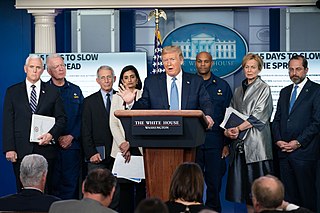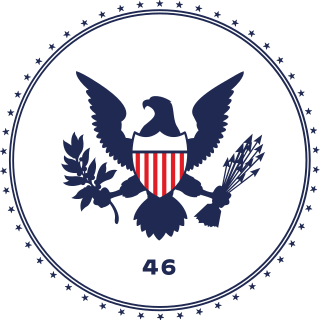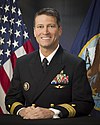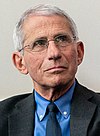
Anthony Stephen Fauci is an American physician-scientist and immunologist who served as the director of the National Institute of Allergy and Infectious Diseases (NIAID) from 1984 to 2022, and the chief medical advisor to the president from 2021 to 2022. Fauci was one of the world's most frequently cited scientists across all scientific journals from 1983 to 2002. In 2008, President George W. Bush awarded him the Presidential Medal of Freedom, the highest civilian award in the United States, for his work on the AIDS relief program PEPFAR.

The Office of Science and Technology Policy (OSTP) is a department of the United States government, part of the Executive Office of the President (EOP), established by United States Congress on May 11, 1976, with a broad mandate to advise the President on the effects of science and technology on domestic and international affairs.

Counselor to the President is a title used by high-ranking political advisors to the president of the United States and senior members of the White House Office.

Stephen Glenn Charles Hilton is a British and American political commentator, former political adviser, and contributor for Fox News Channel. He served as director of strategy for the British Prime Minister David Cameron from 2010 to 2012. Hilton hosted The Next Revolution, a weekly current affairs show for Fox News from 2017 to 2023. He is a proponent of what he calls "positive populism" and a vocal supporter of former U.S. President Donald Trump. He was a co-founder of Crowdpac, but stepped down as CEO in 2018 due to conflicting values with the company.

Andrew M. Slavitt is an American businessman and healthcare advisor who served as the acting administrator of the Centers for Medicare and Medicaid Services from March 2015 to January 2017 and as a temporary Senior Advisor to the COVID-19 Response Coordinator in the Biden administration. A leader of the team that helped to repair the healthcare.gov website after its initial rollout, he was nominated by Barack Obama to run CMS in July 2015. In January 2021, Slavitt accepted a temporary role as Senior Pandemic Advisor to President Joe Biden’s COVID-19 pandemic response team. He stepped down from that role in June 2021.

Senior Advisor to the President is a title used by high-ranking political advisors to the president of the United States. White House senior advisors are senior members of the White House Office. The title has been formally used since 1993.

Regina McCarthy is an American air quality expert who served as the first White House national climate advisor from 2021 to 2022. She previously served as the thirteenth Administrator of the Environmental Protection Agency from 2013 to 2017.

Ronny Lynn Jackson is an American physician, politician, and former United States Navy rear admiral, retroactively retired in the grade of captain. He is the U.S. representative for Texas's 13th congressional district.

Sean Patrick Conley is an American physician and United States Navy officer who served as the Physician to the President from 2018 to 2021. Conley served as physician to president Donald Trump during the COVID-19 pandemic, often serving as the president's medical advisor, and treating the president when he tested positive for COVID-19.

The core White House staff appointments, and most Executive Office of the President officials generally, are not required to be confirmed by the U.S. Senate, with a handful of exceptions. There are about 4,000 positions in the Executive Office of the President.

The White House Coronavirus Task Force was the United States Department of State task force during the Trump administration, the goal of the Task Force was to coordinate and oversee the administration's efforts to monitor, prevent, contain, and mitigate the spread of coronavirus disease 2019 (COVID-19). Also referred to as the President's Coronavirus Task Force, it was established on January 29, 2020, with Secretary of Health and Human Services Alex Azar as chair. On February 26, 2020, U.S. vice president Mike Pence was named to chair the task force, and Deborah Birx was named the response coordinator.

The Donald Trump administration communicated in various ways during the COVID-19 pandemic in the United States, including via social media, interviews, and press conferences with the White House Coronavirus Task Force. Opinion polling conducted in mid-April 2020 indicated that less than half of Americans trusted health information provided by Trump and that they were more inclined to trust local government officials, state government officials, the Centers for Disease Control and Prevention (CDC), and National Institute of Allergy and Infectious Diseases director Anthony Fauci.

Rick Arthur Bright is an American immunologist, vaccine researcher, and public health official. He was the director of the Biomedical Advanced Research and Development Authority (BARDA) from 2016 to 2020. In May 2020, he filed a whistleblower complaint, alleging that the Trump administration ignored his early warnings about the COVID-19 pandemic and illegally retaliated against him by ousting him from his role and demoting him to a position at the National Institutes of Health. On October 6, 2020, Bright resigned from the government. On November 9 he was named a member of President-elect Joe Biden's coronavirus advisory board.

Scott William Atlas is an American radiologist, political commentator, and health care policy advisor. He is the Robert Wesson Senior Fellow in health care policy at the Hoover Institution, a conservative think tank located at Stanford University. During the United States presidential campaigns of 2008, 2012, and 2016, Atlas was a Senior Advisor for Health Care to several presidential candidates. From 1998 to 2012 he was a professor and chief of neuroradiology at Stanford University Medical Center.

The federal government of the United States initially responded to the COVID-19 pandemic in the country with various declarations of emergency, some of which led to travel and entry restrictions and the formation of the White House Coronavirus Task Force. As the pandemic progressed in the U.S. and globally, the U.S. government began issuing recommendations regarding the response by state and local governments, as well as social distancing measures and workplace hazard controls. State governments played a primary role in adopting policies to address the pandemic. Following the closure of most businesses throughout a number of U.S. states, President Donald Trump announced the mobilization of the National Guard in the most affected areas.

Joe Biden assumed office as President of the United States on January 20, 2021. The president has the authority to nominate members of his Cabinet to the United States Senate for confirmation under the Appointments Clause of the United States Constitution.
Paul Elias Alexander is a Canadian independent scientist, and a former Trump administration official at the U.S. Department of Health and Human Services (HHS) during the COVID-19 pandemic. Alexander was recruited from his part-time, unpaid position at McMaster University to serve as an aide to HHS assistant secretary for public affairs Michael Caputo in March 2020. In that role, Alexander pressured federal scientists and public health agencies to suppress and edit their COVID-19 analyses to make them consistent with Trump's rhetoric.

During his term as president of the United States (2017–2021), Donald Trump and his administration repeatedly politicized science by pressuring or overriding health and science agencies to change their reporting and recommendations so as to conform to his policies and public comments. This was particularly true with regard to the COVID-19 pandemic in the United States, but also included suppressing research on climate change and weakening or eliminating environmental regulations.

The presidential transition of Joe Biden began on November 7, 2020, and ended on January 20, 2021. Unlike previous presidential transitions, which normally take place during the roughly 10-week period between the election in the first week of November and the inauguration on January 20, Biden's presidential transition was shortened somewhat because the General Services Administration under the outgoing Trump administration did not recognize Biden as the "apparent winner" until November 23.

















